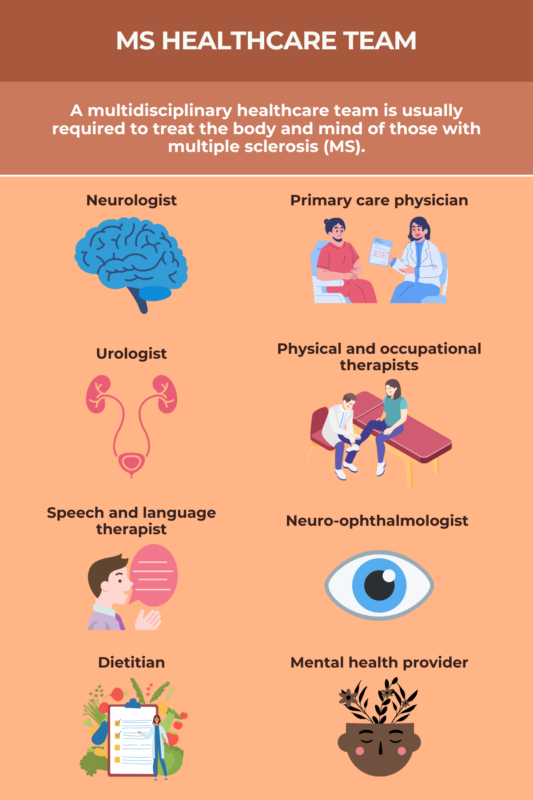 Discussion
Discussion
Your MS healthcare team
Multiple sclerosis (MS) is a progressive autoimmune disorder that can cause an extensive range of symptoms that vary from person to person. The disease’s severity and course will also vary, meaning that, ultimately, everyone with MS will experience it differently.
A highly variable disease like MS requires a diverse team of healthcare specialists, from occupational therapists to mental health providers, to treat both the body and mind. A comprehensive, coordinated multidisciplinary care approach can help those living with MS better manage it.
The members of your care team will depend on your specific symptoms and needs. In addition to a neurologist, there are several other specialists who may become part of your MS care team.
Neurologist
Neurologists are medical doctors who specialize in the diagnosis, treatment, and management of conditions that affect the brain and nervous system, such as MS.
MS care: A neurologist is typically the MS care team leader. After an MS diagnosis, the neurologist will monitor disease progression, discuss treatment options, make recommendations, and generally help you understand the disorder.
When to see: If symptoms — which may include fatigue, numbness and tingling, walking difficulties, pain, and vision problems — change, return, or worsen, contact your neurologist. Unexpected or hard-to-tolerate treatment side effects may also be a reason for a visit.
What to expect: A treatment plan will be based on the state of your health, disease type, symptoms, needs, and preferences. Treatments that may be used to manage your MS include disease-modifying therapies, relapse management medications, and symptomatic therapies. A neurologist can also help with medication management and may refer you to other specialists.
Primary care physician
Primary care physicians (PCP) practice general medicine to help manage all aspects of their patient’s health.
MS care: A PCP can help you maintain your general health and manage any coexisting diseases or conditions, known as comorbidities. After an MS diagnosis, your PCP can help manage and monitor symptoms and treatments.
When to see: If you are experiencing a worsening of MS symptoms or new ones, you should consider a visit to your PCP. Because people with MS generally see their PCP more than their neurologist, the physician may be able to identify problems early.
What to expect: Your PCP can help you with symptom management after an MS diagnosis.
Urologist
A urologist specializes in the diagnosis and treatment of disorders of the urinary system. Specialists in neuro-urology focus on bladder and other conditions related to neurological disorders such as multiple sclerosis.
MS care: People with MS frequently experience bladder and urinary issues, including difficulty urinating or urgent or frequent urination, which the urologist can potentially address with medications, surgery, or other techniques. Urologists may also be able to address sexual health problems related to nerve impulse damage in men with MS.
When to see: If you are experiencing bladder or urinary issues, or erectile dysfunction, it may be time to see a urologist.
What to expect: You may undergo urine flow tests and ultrasounds and other imaging tests for diagnosis. Symptom severity will be assessed and, if needed, treatments adjusted.
Physical therapist and occupational therapist
A physical therapist (PT) focuses on a person’s ability to move their body, while an occupational therapist (OT) tries to improve the ability to do day-to-day tasks.
MS care: Depending on MS type and other factors, some patients may experience symptoms such as muscle spasms, balance problems, or fatigue that can affect their quality of life. PTs can help with mobility and moving around, and with improving strength and range of motion. OTs can help with activities related to daily living including bathing, dressing, and eating.
When to see: If symptoms affect mobility or motor function, or the ability to perform everyday tasks, a physical or occupational therapist may be able to help you.
What to expect: The therapist will review your medical history and notes or referrals from a physician or other healthcare professional. They may also assess functions and movements, and develop a plan outlining goals and expected outcomes. They may do hands-on therapy, show you exercises and stretches, and how to use equipment.

Speech and language therapist
A speech and language therapist treats many types of communication and swallowing problems, including problems with turning sounds into words.
MS care: They can assess, diagnose, and treat problems that MS patients may experience with speech and swallowing (dysphagia) due to muscle weakness and neurological problems in the face and jaw. This may include dysphonia, which is an impairment of voice production, as well as cognitive difficulties related to MS that may also affect how a person speaks and uses language.
When to see: If you notice changes in speaking or swallowing, or people are having trouble understanding what you are saying, it may be beneficial to see a speech and language therapist.
What to expect: You will likely be given an assessment, which can include neurological test exams of the tongue and swallowing muscles, or an imaging test to check your ability to chew or swallow. Working with you and your physician, the therapist can create a personalized treatment plan — which may include safe practices, dietary changes, or exercises — to address specific problems.
Neuro-ophthalmologist
As physicians with a focus in neurology and ophthalmology, neuro-ophthalmologists are eye doctors who treat conditions such as optic neuritis (inflammation of the optic nerves) that are associated with neurological conditions.
MS care: MS can damage the optic nerves, which connect the eyes to the brain. This can cause eye problems such as blurriness, double vision, temporary vision loss, color blindness, and eye pain and twitching. Multiple sclerosis can also attack the nerves that control the muscles involved with eye movement. A neuro-ophthalmologist can help address these issues.
When to see: If you are having vision problems, you may want to inquire about making an appointment, as MS symptoms tend to worsen as the disease progresses.
What to expect: Testing will be done, followed by potential treatments such as anti-inflammatory or corticosteroids medications. Some conditions are short-lived or will get better on their own.
Registered dietitian
Dietitians can offer nutritional counseling and create specific diets, blending nutrition with scientific research to promote health.
MS care: Strategies to maintain health and overall wellness include proper nutrition. While there is no robust evidence supporting a specific MS diet, a nutritious, balanced diet can help better manage and control the disease.
When to see: It’s a good idea to establish and follow a nutritious, personalized diet early in the disease course to improve overall wellness.
What to expect: A dietitian can assess your nutritional and health needs, as well as food preferences, and work with your care team to create a dietary plan. The plan will be monitored and changed as needed.
Psychologist or mental health provider
A psychologist is a mental health professional who uses psychological assessments and talk therapy to help people better cope with life and mental health conditions.
MS care: MS symptoms can affect your emotional health, as well as moods and anxiety levels. The progression of MS symptoms can also bring about emotional changes, starting with the diagnosis. Common emotions may include grief, sadness, fear, worry, and irritability. Depression is also not uncommon. A psychologist can help address these and other issues.
When to see: If emotions become overwhelming or are difficult to control, it might be a good idea to contact a mental health provider who can help you work through any depression, stress, or anxiety you may be feeling.
What to expect: To make an assessment, a psychologist will ask about social support and any changes in sleeping habits, appetite, or other behaviors. They will then work with you to create a treatment plan.
Multiple Sclerosis News Today is strictly a news and information website about the disease. It does not provide medical advice, diagnosis or treatment. This content is not intended to be a substitute for professional medical advice, diagnosis, or treatment. Always seek the advice of your physician or another qualified health provider with any questions you may have regarding a medical condition. Never disregard professional medical advice or delay in seeking it because of something you have read on this website.
Recommended Posts
- Ironically, cutting out coffee gave me a boost of energy
- MS Awareness Month events highlight advocacy, education, fundraising
- I’m going to be more open about my invisible scars from MS
- Having parents who smoked increases risk of pediatric MS: Study
- Ocrevus and Tysabri appear to work equally well to control relapsing MS
Related Articles
-
 Discussion
Discussion
-
-
 Fact-checked by
Fact-checked by 




